- Home
- Burt L. Standish
The Swan and Her Crew Page 34
The Swan and Her Crew Read online
Page 34
CHAPTER XXXII.
Heron-hawking.--Great Bustard.--Stock-dove in Rabbit-hole.-- "Dowe" Dogs.--Search for Bustards' Eggs.
The boys were to see a little more hawking. One of the gentlemen whoshot their hawk was kind enough to give them an invitation to spend afew days at his house near Thetford, with the promise that he would showthem some hawking carried on in the good old fashion, and with splendidhawks brought from Iceland. A neighbour of his cultivated hawking, andspared no expense in the noble pastime.
The boys debated some time whether they should accept this invitation ornot. Frank was still sore about the loss of his hawks, and hardly caredto see others more successful than himself, but Dick said,--
"Don't be selfish, Frank. When you see the sport you will forget allabout our loss; and besides, the invitation is meant kindly, and weought not to refuse it out of pique."
Frank saw the wisdom of this, and so one fine November day they foundthemselves in company with their host, walking across the immense tractof common, or warren, which lies between Thetford and Brandon. They wereon their way to "the meet." On a knoll where a single fir-tree raisedits red stem in the wintry sunlight were assembled a number of ladiesand gentlemen, some on horseback, and some on foot. Two men came upbearing square frames, on which were the hawks, large falcons, which hadbeen brought at great expense from Holland and Iceland. They werehooded, and the hoods were gaily decorated with tassels and feathers.
"What are they going to fly the hawks at?" asked Dick. "They won't wastethe energy of such magnificent birds as those on rabbits and plovers,and I see nothing else about."
"They expect some herons will pass over on their way from theirfeeding-grounds to the heronry," said Frank.
COMMON HERON.]
Presently the company moved forwards, as a speck on the distant horizontold of the probable approach of their quarry. As it came nearer itproved to be a heron, and its flight was directed straight towards them,and at no great distance from the ground. When the advancing bird camewithin one hundred yards of the group, it seemed to think there might besome danger awaiting it, and it swerved aside continuing its course soas to pass them on one side. Two of the hawks were unhooded, and thenoble birds, catching sight of their quarry, launched into the air inpursuit of it. When the heron saw the hawks it uttered a cry, andimmediately rose in the air and soared to a great height. The meaning ofthis was apparent when the hawks, instead of attacking it on a levelwith themselves, circled up with great swiftness, and tried to riseabove the heron, so that they might swoop down upon it. The heron rosewith outstretched neck, and wings which moved with great swiftness, inspite of their size; but the hawks still soared and soared in widecircles, and the party below rode and ran keeping as nearly as possibleunder the birds. The hawks had now risen above the heron, but still theywent on circling higher and higher, until they were mere specks in thesky. Then they suddenly grew large as they swooped down, and the herongave another cry, and half turned on his back as they struck him almostsimultaneously, and hawks and heron fluttered down a struggling mass tothe ground. The hawks were taken off and hooded, and after a shortinterval another heron came in sight, and the other two hawks were flownat it.
When the sport was over, Frank got hold of one of the warreners who hadcome to see it and asked him if he had ever seen any great bustardsabout the warren, or the adjacent fens.
"Oh, ay, sir, when I was a lad many and many a one have I seen, but nowI have not seen one for more than three years. They be almost killed outof the land now. One is to be seen every two or three years, but it isalways shot or trapped."
"What sort of a bird is a great bustard?" asked Dick.
"It is a game bird as large as a full-sized turkey, and far bettereating. There used to be droves of them on the fens and the warrens, butthey were shot and trapped right and left. I mind when I was a boy Ihave seen as many as twenty together on a warren, and then the warrenersused to set a battery of guns, and have a long string fastened to allthe triggers. Maybe the string was half a mile long, and then the men atwork on the warrens, or the marshes, had orders to pull the string whenthey saw the bustards within reach of the guns. They used to stalk themby walking on the off-side of a horse, and, keeping it between them andthe bustards, walk round and round until they came within shot."
The warrener was a very intelligent man, and he told them much about thehabits of this noble bird, which is now nearly extinct in England.
"Have you ever found its nest?" asked Jimmy.
"Yes, when I was a lad I found two or three. The eggs were good eating,so we took them, and as they were big eggs and laid on the ground, itwas easy enough to find their nests if you knew where to look."
"I suppose you haven't got any of their eggs now?" said Frank.
"No, sir, I haven't; but I have a notion that two or three years ago Isaw two or three of their eggs in a cottage somewhere over yonder."
GREAT BUSTARD.]
He pointed to the western sky, but to the boys' eyes no cottages werevisible; and upon their asking him for further information, he told themthat beyond a ridge of trees which crested a warren were some half-dozencottages, and he thought it was in one of those that he had seenbustards' eggs, but he was not at all sure.
"What is the meaning of this?" asked Dick, pointing to the mouth of arabbit-hole which was barred in with sticks like a cage. Inside thesticks were the feathers and part of the skeleton of a stock-dove.
The warrener replied,--
"The doves breed in the rabbit-holes, and we warreners keep a 'dowe'dog, which will tell us at once what holes have nests in them; and then,when the young ones are almost ready to fly, we fasten them in theburrow with sticks, just like that, and the old ones feed the young onesthrough the bars, and when the young ones are fit to eat we kill them. Isuppose the man who fastened that burrow in forgot where it was, or theyoung one died before it was worth eating."
DOVES.]
The boys now had to go back with their host, who, by the way, made themso comfortable that they forgave him for shooting their hawk.
The next day found the boys approaching the cottages where the warrenertold them the bustards' eggs might be found.
"Now," said Frank, as they stopped under the lee of the wood, "let ushave a consultation. How had we better go to work? If we show them thatwe have come specially for the eggs they will ask too great a price forthem. I vote we go and ask for a drink of water, and then praise thechildren, if any, and so get into conversation; and then ask in anincidental way about the bustards."
This seemed the proper way of going to work, so they appointed Frankspokesman, and then marched up to the nearest cottage. A woman openedthe door to them, and peeping in, they saw behind her half-a-dozenchildren, all young.
"Can you give us a drink of water, ma'am?" said Frank, in his politesttone.
"Oh yes, sir," answered the woman with a curtsey. "Won't you stepindoors. But wouldn't you like a cup of milk better than water?"
"Thank you, very much," replied Frank. "But what nice little childrenyou have got," and he patted one on the head.
"Lovely," said Jimmy enthusiastically, and picking out the cleanest hekissed it.
"Well, sir," answered the woman with a smile, "they be as healthy asmost, and as fine I dare say, but they are a great deal of trouble."
"Ah, I have no doubt they are," replied Frank sympathizingly; and as hespoke his eyes were wandering about, looking at the ornaments on thechimney-piece to see if any eggs were there; but nothing of the kind wasto be seen.
"This is a fine open country, ma'am."
"It is that, sir," she said.
"And plenty of rabbits and plovers about."
"There are that, sir."
"Have you ever seen any bustards about?"
"No, I have heard tell of them, but it was before my time."
"And I suppose you have never seen any nests or eggs?"
"No, sir, never; but my little boy has some throstle's eggs, i
f so be asyou would like to have them."
"No, thank you," said Frank; and thanking her for the milk, andbestowing a small coin on one of the children, the boys made their exit.
"It is your turn to do the next kissing, Dick," said Jimmy.
"All right," replied Dick cheerfully.
The cottages lay at some little distance apart, and they visited themall in turn, but with the like ill success. Then, as they were thinkingof giving it up as a bad job, they espied another small cottage in alittle hollow, by a well.
"Let us try this, for the last one," said Frank.
"Very well," said Jimmy "but pray, don't ask for any more to drink. Ihave the best intentions in the world, but I really cannot find room forany more."
Beside the cottage was a silvery-haired old man, mending a brokenpaling. Frank went straight at it this time.
"Good morning."
"Good morning, sir," replied the man, touching his hat.
"Have you ever seen any bustards' eggs?"
"Yes, sir, I have two in the house. Would you like to see them?"
"We should."
"Then step in, sirs. I can give 'ee a glass of good nettle beer."
Jimmy groaned inwardly at the mention of the beer, but the sight of theeggs upheld him.
"Here they be, sir," said the old man, taking down two brown eggs withrusty spots on them, off the chimney-piece. "I took them myself out ofthe nest in yon fen when I was a lad."
"Will you sell them?"
"Ay, sure. It be a wonder how they come not to be broken, for I havetaken no particular heed of them."
"What will you take for them?"
"What you likes to give, sir."
"I would rather you would fix your own price."
"Well, then, if you give me a shilling, I shall be fain."
"No, no, they are worth more than a shilling. We cannot afford to giveyou what you would get in London for them, and it is only fair to tellyou so, but we will give you half-a-crown apiece for them."
"I shall be very glad to have that much for them, sir, if you think theyare worth it to you."
So the bargain was concluded, and the boys became the happy possessorsof these rare eggs.
I have just been reading, in the _Field_ a very interesting account ofthe appearance of a great bustard in Norfolk. A gentleman there was toldby one of his men that he had seen a "wonderful cur'us bird like apelican," in a wild part of the fen. The gentleman at once went to lookat it, and being a naturalist, he was much delighted to find that it wasa bustard, and observation through a telescope told him that it was acock bird. He gave strict orders that it was not to be shot, and thatany prowling gunner found on his land was to be consigned withoutceremony to the bottom of the nearest dyke. Then he sent for well-knownnaturalists from Cambridge and elsewhere, to come and watch the motionsof the bird. It was feeding in a lonely part of the fen, in a patch ofcole seed, and, each man being armed with a telescope of some sort orother, they had good views of it, both flying and walking. The news soonspread among the naturalists of the county, and one of them, who hadsome tame bustards in confinement, generously offered to give one ofthem to be let loose to pair with the wild cock. A female bustard wasaccordingly turned out into the fen as near to the wild bird as theydared to venture without frightening him away, and after a short time,they had the pleasure of seeing the two walking about together. In a dayor two more the hen was found dead in a dyke. Her wings having beenclipped she could not fly far enough. Another female was procured, butwhile seeking for an opportunity of turning it out where the wild onecould see it, the wild one flew away. It was heard of afterwards in adifferent part of the county, and it does not appear yet to have beenkilled, and the landowners have given orders that it shall not bedestroyed. I am looking forward with interest for further accounts ofit.

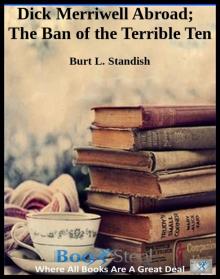 Dick Merriwell Abroad; Or, The Ban of the Terrible Ten
Dick Merriwell Abroad; Or, The Ban of the Terrible Ten Wild Adventures round the Pole
Wild Adventures round the Pole Storm-Bound; or, A Vacation Among the Snow Drifts
Storm-Bound; or, A Vacation Among the Snow Drifts In the Yellow Sea
In the Yellow Sea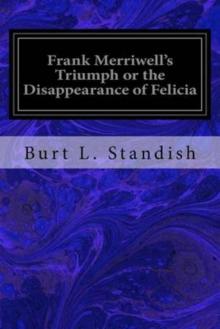 Frank Merriwell's Triumph; Or, The Disappearance of Felicia
Frank Merriwell's Triumph; Or, The Disappearance of Felicia Treasure of Kings
Treasure of Kings Bert Wilson's Twin Cylinder Racer
Bert Wilson's Twin Cylinder Racer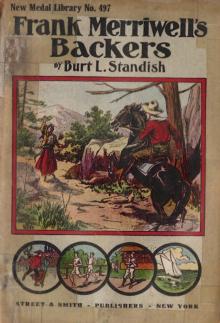 Frank Merriwell's Backers; Or, The Pride of His Friends
Frank Merriwell's Backers; Or, The Pride of His Friends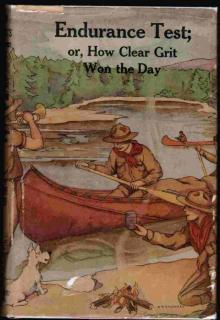 Endurance Test; or, How Clear Grit Won the Day
Endurance Test; or, How Clear Grit Won the Day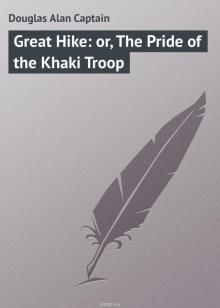 Great Hike; or, The Pride of the Khaki Troop
Great Hike; or, The Pride of the Khaki Troop The Swan and Her Crew
The Swan and Her Crew A cup of sweets, that can never cloy: or, delightful tales for good children
A cup of sweets, that can never cloy: or, delightful tales for good children Frank Merriwell's Bravery
Frank Merriwell's Bravery Frank Merriwell Down South
Frank Merriwell Down South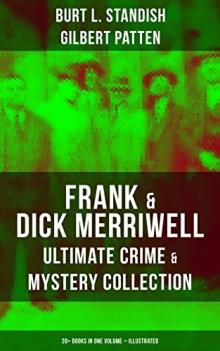 Dick Merriwell's Trap; Or, The Chap Who Bungled
Dick Merriwell's Trap; Or, The Chap Who Bungled The Trail of the Seneca
The Trail of the Seneca Wild Life in the Land of the Giants: A Tale of Two Brothers
Wild Life in the Land of the Giants: A Tale of Two Brothers From Squire to Squatter: A Tale of the Old Land and the New
From Squire to Squatter: A Tale of the Old Land and the New The Cruise of the Snowbird: A Story of Arctic Adventure
The Cruise of the Snowbird: A Story of Arctic Adventure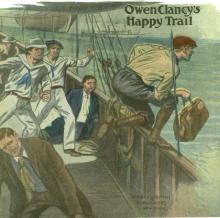 Owen Clancy's Happy Trail; Or, The Motor Wizard in California
Owen Clancy's Happy Trail; Or, The Motor Wizard in California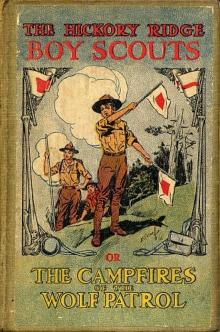 Boy Scouts: Tenderfoot Squad; or, Camping at Raccoon Lodge
Boy Scouts: Tenderfoot Squad; or, Camping at Raccoon Lodge Sing a Song of Sixpence
Sing a Song of Sixpence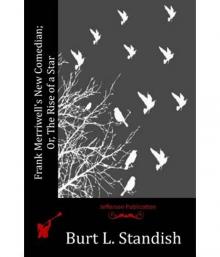 Frank Merriwell's New Comedian; Or, The Rise of a Star
Frank Merriwell's New Comedian; Or, The Rise of a Star The Sa'-Zada Tales
The Sa'-Zada Tales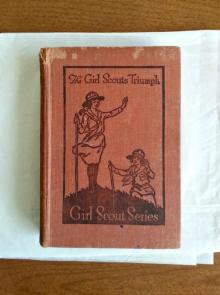 The Girl Scout's Triumph; or, Rosanna's Sacrifice
The Girl Scout's Triumph; or, Rosanna's Sacrifice Wild Adventures in Wild Places
Wild Adventures in Wild Places Fairies I Have Met
Fairies I Have Met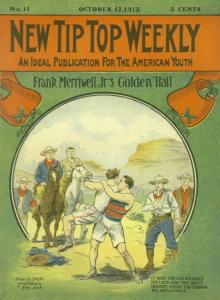 Frank Merriwell's Son; Or, A Chip Off the Old Block
Frank Merriwell's Son; Or, A Chip Off the Old Block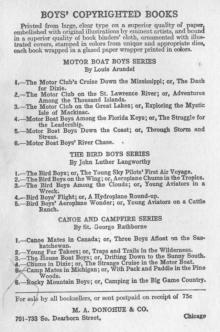 Motor Boat Boys' River Chase; or, Six Chums Afloat and Ashore
Motor Boat Boys' River Chase; or, Six Chums Afloat and Ashore Frank Merriwell's Athletes; Or, The Boys Who Won
Frank Merriwell's Athletes; Or, The Boys Who Won Bart Keene's Hunting Days; or, The Darewell Chums in a Winter Camp
Bart Keene's Hunting Days; or, The Darewell Chums in a Winter Camp Captain June
Captain June